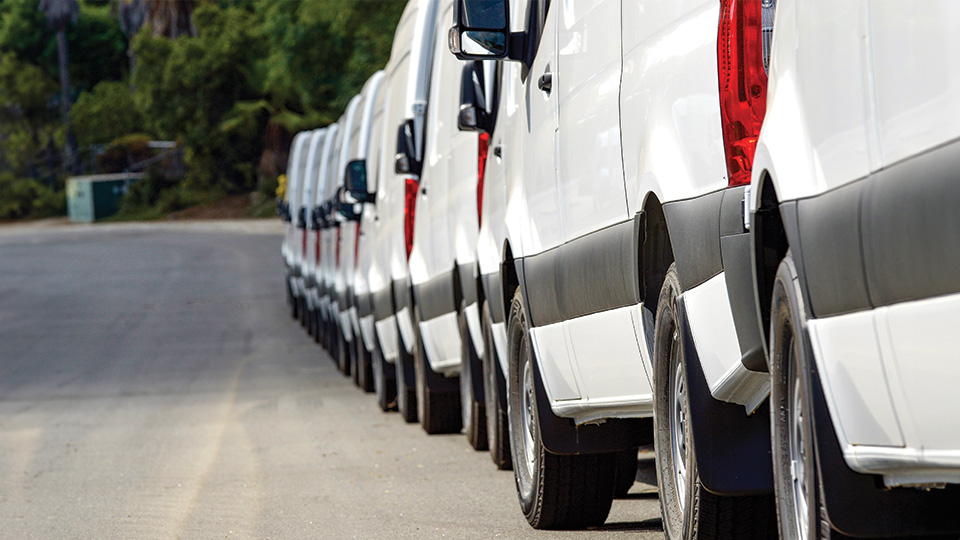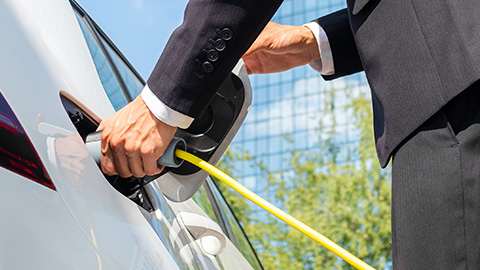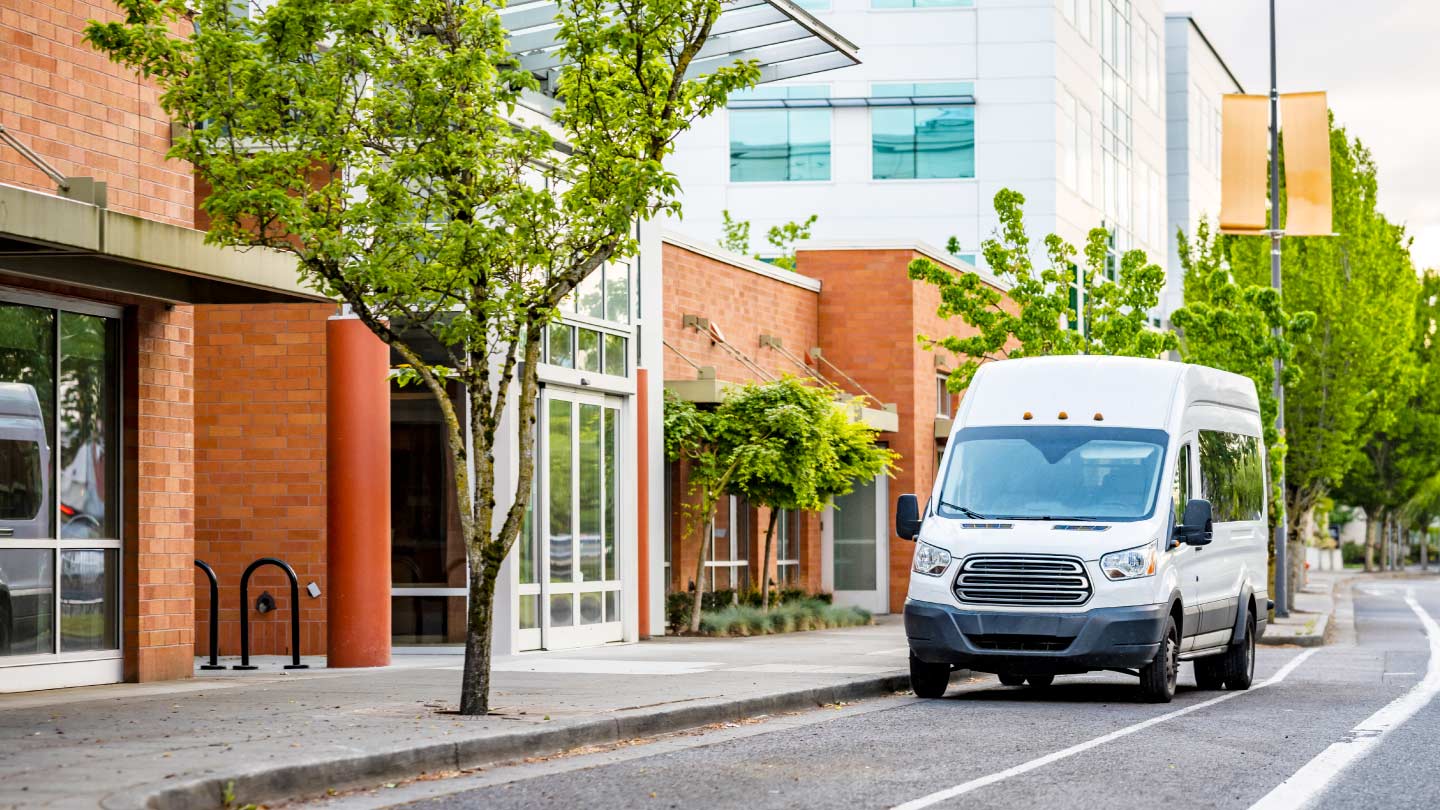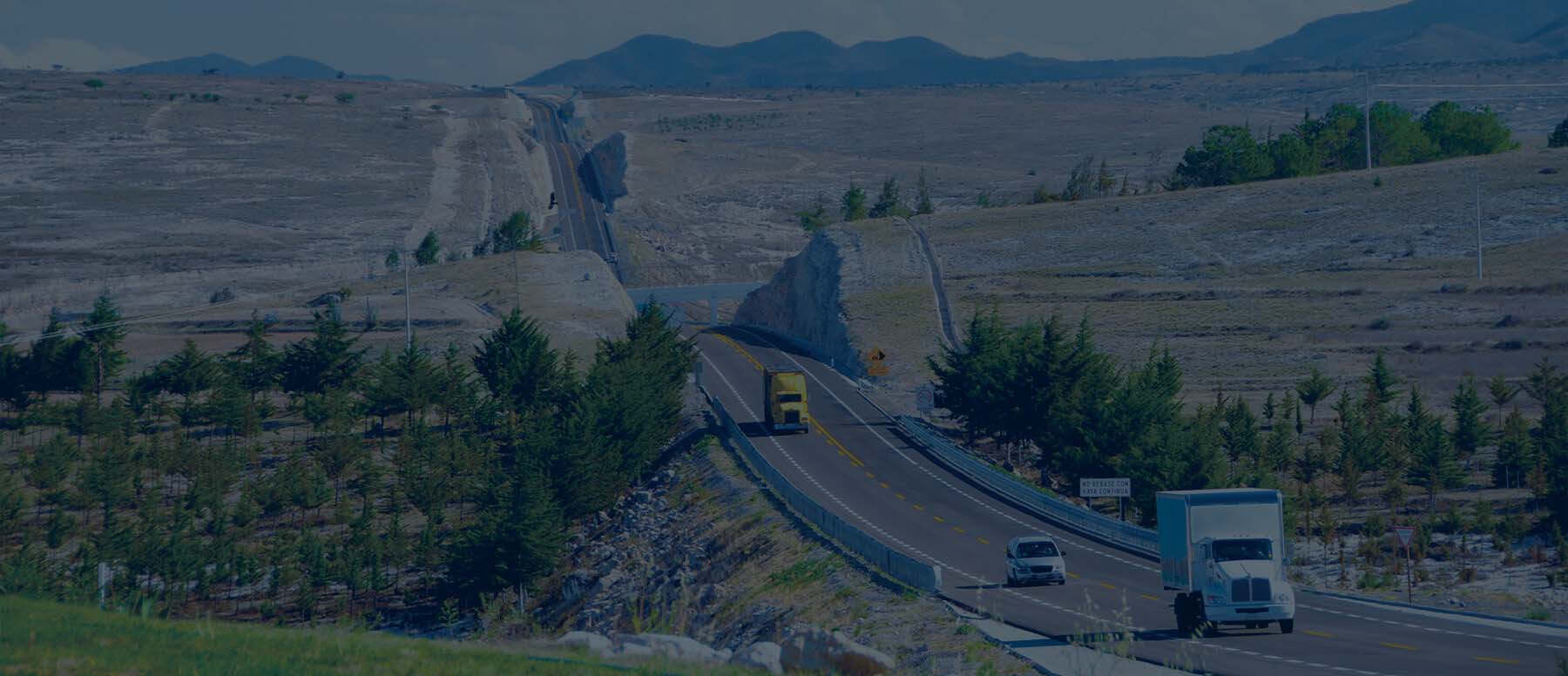
Overview of NOM-012 weights and measures regulations for Mexico what they mean

Table of contents
What do I need to know?
Against a backdrop of opposition, Mexico moves forward with new trucking regulations in an effort to decrease truck-involved accidents and relieve traffic congestion.
NOM-012 governs the weights and dimensions of Heavy-Duty trucks travelling on roads and highways, and sets specific requirements for double-articulated trailers, called “fulles” in Mexico [1,2]. The changes require double-trailers to undergo certification, or “express authorization,” to operate and must be equipped with safety features like GPS and speed governors. The law went into effect in early
July 2018 and is now being enforced[3].
At the same time, new Hours of Service (HOS) regulations have been published which set the standards for driving time and breaks [4]. For the first time in Mexico, drivers of commercial motor vehicles will be required to carry HOS logs, either in printed or electronic format. The regulations are set out in NOM-087[5].
NOM-012 overview
Key requirements for double-trailers
With the latest additions, here is an overview of some of the regulations in NOM-012 and how they affect double- trailer tractors:
GPS: Trucks must now be equipped with GPS tracking. These devices must be able to report position and speed, at a minimum. The data must have a backup system, and the data must be made available to the Secretariat and the Federal Police, as requested. Speed data may be used to confirm compliance with laws.
Truck Dimensions: Not including mirrors and accessories, the maximum width is 2.60 meters, and the maximum height is 4.25 meters (length specifications are also specified depending on the road type).
Driving Parameters: Drivers must stay in the far right lane, except in cases of overflow, and they must keep at least 100 meters behind other Heavy-Duty vehicles.
Holidays: The Secretariat may define and publish additional security measures around holiday periods that sustain large amounts of vehicle traffic.
Curvy Roads: Drivers must pull over/stopon winding roads to allow for the circulation of traffic.
ABS: Trucks must have anti-lock brakes and an automatic brake adjustment system.
Safety Equipment: Trucks must be equipped with speed governors to keep them under 80 kilometers per hour, as well as have daytime running lights and auxiliary mirrors.
Certification and enforcement
To lawfully operate on federal roads, all double-trailers must complete a registration process with the Ministry of Communications and Transportation (SCT, Spanish acronym) and obtain an “express authorization” for each trailer. The law applies to domestic and imported trucks. The certification is free; however, it now requires the physical verification of all compliance checks, including length of truck, mirrors, driving logs, and GPS [6]. It’s important to note that the express authorization does not replace the motor carrier permit.
To request authorization for double-articulated trailer tractors, fleets can start the three-step process via the SCT website [7]. As of July 2018, the SCT has released more than 106,000 requests for express authorization of double- articulated vehicles [8].
Verification
According to the regulatory text, the SCT — via the Federal Police — is coordinating verifications at fixed centers. The SCT may grant self-regulation to carriers with onsite electronic weighing and scaling capabilities. An application for self-regulation must outline every stage of the loading process, as well as how internal monitoring is enforced to ensure that all shipments comply. The SCT may also do on-site inspections before granting self-regulation.
Authorized roads
Once operators receive express authorization, they can travel with double-trailers on Type “ET” and “A” roads, though exceptions are available for roads of lower classifications but required a separate “connectivity authorization” from the SCT.
Exceptions
Few exemptions are outlined for express authorization and seem mostly limited to tow vehicles. Other specialty equipment may also be exempt, but it still must be indicated in the record of weight and dimensions and designated as a special vehicle with a specific design. Other vehicles that do not meet the standards will not be allowed for import or transit on government roads.
Enforcement and penalty for non-compliance
Ongoing enforcement will continue via the Federal Police, especially when it comes to enforcing regulations such as maximum speed, daytime running lights and distance between trucks. Federal Police may also do random verifications on the road, including for fleets that are self-regulating. If a fleet has been granted self-regulation, but is then found three times within a single year to violate the standards, then the self-regulation license will be suspended and a fine issued.
Trucks that do not comply may be fined, and if the fine goes unpaid, the truck will be taken off the road and cargo must be switched to a single tractor/trailer, or to a compliant double-trailer tractor.
Due to a backlog, the SCT stated that full enforcement and issuance of all express authorizations could take until the end of 2018 [9].
Note: The enforcement period for trucks operating with lights on at all times (it must be an electronic function that automatically turns the lights on) begin later on January 1, 2019.
Objectives of NOM-012
Safety. The primary purpose of the changes to NOM-012 is to support road safety and decrease vehicle accidents, and ultimately, to remove unsafe trucks from the road. The changes also setup and help spark fleet connectivity in Mexico with the requirement of GPS installed. While items like GPS were encouraged in previous versions of the law, this latest version explicitly requires it.
When industry stakeholders and the SCT began reviewing NOM-012 and its 2014 version, it cited two main purposes for seeking changes [10]:
- [translated] “to encourage motor carriers to operate at all times with greater safety conditions, and second, to obtain a real sampling of the conditions in which they operate in the federal highways.”
- The second purpose also included examining levels of security on federal roads, such as being able to monitor and check driver speed via GPS, in an attempt to reduce the number of collisions that involve heavy-duty trucks.
Double-trailer safety concerns
Double-trailer trucks have long received criticism in Mexico. A safety activist who lost his son in a collision with a double-trailer truck claims that there are an average of 1,600 fatal accidents involving double-trailers every year [11]. His goal is to ban the trucks altogether. However, industry advocates and government officials say that this number is far less, with double-trailer trucks accounting for less than 3 percent of fatal accidents in Mexico [12].
Others in the industry have also pointed to insufficient regulations or poor implementation and enforcement of trucking regulations as the cause of safety issues, particularly related to speeding or driver licensing [13].
Double-trailer trucks have also undergone the same scrutiny and concern for safety in the U.S [14]. The debate is sure to continue.
Examining the impact of NOM-012 regulations
NOM-012 will have a significant impact on the trucking industry in Mexico. The following is a summary of some of the reported potential effects.
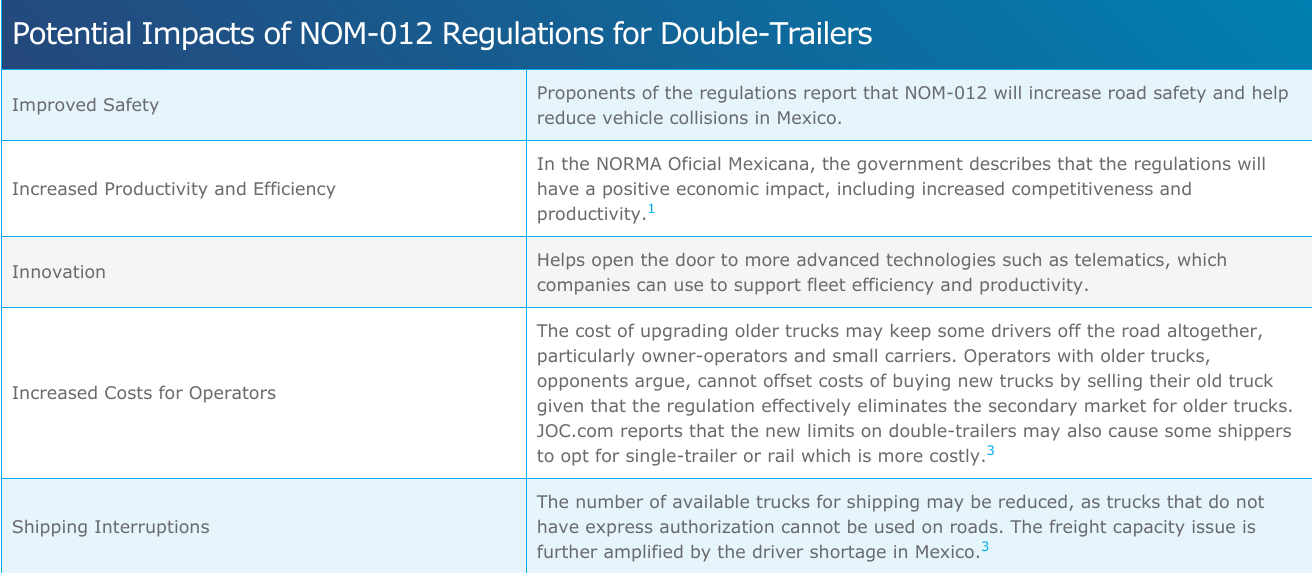
Demonstrations have been held in protest to the law. One demonstration, which occurred within days of the start of enforcement, involved 612 cargo units stopped at the Port of Altamira to peacefully protest fines. Some trucking industry stakeholders have asked the government to extend the deadline [3,15].
Geotab and fleet compliance
Geotab helps companies address compliance with Mexico’s government requirements. Our Geotab GO vehicle tracking devices and open platform fleet management solution, with regards to transportation vehicles in the federal jurisdiction, facilitates compliance to the requirements of a high-tech control device for greater safety.
Additionally, Geotab’s expandability and Marketplace of third-party solutions helps fleets optimize other aspects of their operations, such as optimizing delivery routes, reducing fuel consumption, and controlling costs.
Geotab solutions for compliance:
- Geotab Cloud ELD for Electronic Logging (USA)
- Driver Vehicle Inspection Reports
- In-Vehicle Driver Coaching
- Collision Notification
- Advanced Fleet Reports
- Seat Belt Usage Detection
- Set Rules and Alerts to Reinforce Company Policies
Geotab GO devices have the following three certifications, in accordance with the Mexican Official Standards:
1. Normalización Y Certificación Electrónica (NYCE) — In Mexico, NYCE, is the agency responsible for developing standards for electronics, telecommunications and information technology, as well as the lead agency in providing certification and verification services for these sectors and many others.
NYCE is a strategic partner of the industry and its consumers and is committed to offering safety and confidence for more than 20 years of operations in Mexico.
Specifically, Geotab has the Certificates of New Product and Record of Compliance Certificate issued by NYCE.
2.Norma Oficial Mexicana (NOM) — The Norma Oficial Mexicana is the obligatory technical regulation issued through the National Standardization Consultative Committees, in accordance with article 40 of the Federal Law on Metrology and Normalization (LFMN, Spanish acronym).
Geotab’s GO7 device and IOX help with your NOM compliance efforts:
- NOM-081 SCT1-1993: A mobile radiotelephony system band.
- NOM-001-SCFI-1993: Establishes the safety requirements and test methods that must be met during the design and construction processes of electronic devices which use electrical energy supplied by public utility and other energy sources (cells, batteries, etc.) to prevent and eliminate the following risks of bodily injury to the users and to safeguard their property.
- NOM 024-SCFI-2013: Establishes the requirements for commercial information to be displayed by packaging instructions, and guarantees of electronic, electrical products, devices, and accessories and consumables to the consumer when marketed in the territory of the United Mexican States.
3.Instituto Federal de Telecomunicaciones (IFT) — The Federal Institute of Telecommunications is an autonomous body. Its purpose is to ensure the efficient development of telecommunications and broadcasting, in accordance with the provisions of the Constitution and the laws in the field of responsibility.
The IFT is in charge of regulating, promoting, and supervising:
- the use and exploitation of the radioelectric spectrum, networks, and the provision of telecommunications and radio broadcasting (TyR, Spanish acronym) services in Mexico
- access to infrastructure and other essential supplies
- the guarantee of the right to information and universal access to these services
It is also the authority in matters of economic competition in the telecommunications and broadcasting sectors.
Geotab possesses the Certificate of Homologation issued by IFT. This standard, which also complies with NOM-081, outlines the technical requirements to standardize the compatibility of mobile radiotelephone systems with cellular technology. Its primary purpose is to verify that any telecom device has the authorization to connect to the Mexican Telecom Network.
Conclusion
Now in effect, NOM-012 exemplifies Mexico’s desire to lower the rate of truck-involved accidents and reduce traffic congestion. With the primary goal of increasing road safety, NOM-012 explicitly sets weight and dimension requirements for Heavy-Duty trucks as well as GPS, safety equipment, and ABS enforcement, amongst other requirements for double-articulated trailers. Those responsible for their fleet operations must obtain “express authorization” to legally drive their trucks. Though NOM-012 poses some challenges for operators, compliance is necessary to maintain productivity, avoid fines, and support road safety.
To learn more, visit geotab.com or contact: latam@geotab.com
Editors: Melanie Serr and Mili Muniz
References
- Diario Oficial de la Federación. (2017, Dec. 26). NORMA Oficial Mexicana NOM-012-SCT-2-2017, Sobre el peso y dimensiones máximas con los que pueden circular los vehículos de autotransporte que transitan en las vías generales de comunicación de jurisdicción federal. [Online]. Available: http://www.dof.gob.mx/nota_detalle.php?codigo=5508944&fecha=26/12/2017
- gob.mx. (2015, Jan. 11). Mañana entra en vigor la NOM-012 sobre pesos y dimensiones. [Online]. Available: https://www.gob.mx/sct/prensa/manana-entra-en-vigor-la-nom-012-sobre-pesos-y-dimensiones?idiom=es-MX
- H. Morley. (2018, Jul. 19). Mexican truck capacity concern ticks up over tractor trailer rule. JOC.com. [Online]. Available: https://www.joc.com/trucking-logistics/truckload-freight/mexican-truck-capacity-concern-ticks-over-tractor-trailer-rule_20180719.html
- Diario Oficial de la Federación. (2017, Jul. 6). PROYECTO de Norma Oficial Mexicana PROY NOM-087-SCT-2-2017, Que establece los tiempos de conducción y pausas para conductores de los servicios de autotransporte federal. [Online]. Available: http://www.dof.gob.mx/nota_detalle.php?codigo=5485842&fecha=07/06/2017
- M. Ceron. (2018, Jul. 10). NOM-087, disciplina para el autotransporte. Revista Transportes y Turismo. [Online]. Available: https://tyt.com.mx/noticias/nom-087-disciplina-para-el-autotransporte/
- Transporte.mx. (2018, Jun. 22). No hay periodo extra para trámites de permisos de fulles: SCT. [Online]. Available: http://www.transporte.mx/no-hay-periodo-extra-para-tramites-de-permisos-de-fulles-sct/
- SCT. (2018, Jul. 13).Autorización Expresa para configuraciones de Tractocamión Doblemente articulado. [Online]. Available: http://www.sct.gob.mx/transporte-y-medicina-preventiva/autotransporte-federal/tramites-y-servicios/autorizacion-para-doble-remolque/
- Transporte.mx. (2018, Jun. 21). SCT otorga más de 100,000 permisos para fulles. [Online]. Available: http://www.transporte.mx/sct-otorga-mas-de-100000-permisos-para-fulles/
- M. Rocha. (2018, Jul. 10). Lento el engomado de doble remolque. El Sol del Centro. [Online]. Available: https://www.elsoldelcentro.com.mx/local/lento-el-engomado-de-doble-remolque-1829765.html
- gob.mx. (2016, Oct. 5). Palabras del Secretario durante la firma de las bases de colaboración SEGOB-SCT, para reforzar la supervisión de autotransporte de carga. [Online]. Available: https://www.gob.mx/sct/prensa/palabras-del-srio-gerardo-ruiz-esparza-durante-la-firma-de-las-bases-de-colaboracion-segob-sct-para-reforzar-la-supervision-de-autotransporte-de-carga?idiom=es-MX
- Mexico News Daily. (2017, Apr. 21). Double semi-trailers cause 1,000 deaths. [Online]. Available: https://mexiconewsdaily.com/news/double-semi-trailers-cause-1000-deaths-opponent/
- Milenio. (2017, Apr. 21). Choques, por error humano, no por dobles remolques. [Online]. Available: http://www.milenio.com/estados/choques-por-error-humano-no-por-dobles-remolques
- Mexico News Daily. (2018, Aug. 3). Double trailer safety addressed years ago. [Online]. Available: https://mexiconewsdaily.com/news/double-trailer-safety-was-addressed-years-ago/
- CBS News. (2018, Jan. 21). Longer double tractor trailers could be on their way. [Online] Available: https://www.cbsnews.com/video/longer-double-tractor-trailers-could-be-on-their-way/
- J. Castro. (2018, Jun. 30). PROTESTA: PARAN 612 TRÁILERES. Expreso.press. [Online] Available: https://expreso.press/2018/06/30/protesta-paran-612-traileres/
Post Tags
About Geotab
Geotab is a global leader in connected transportation solutions. We provide telematics — vehicle and asset tracking — solutions to over 50,000 customers in 160 countries. For more than 20 years, we have invested in ground-breaking data research and innovation to enable partners and customers, including Fortune 500 and public sector organizations, to transform their fleets and operations. With over 4 million subscriptions and processing more than 75 billion data points a day, we help customers make better decisions, increase productivity, have safer fleets, and achieve their sustainability goals. Geotab’s open platform and Marketplace, offers hundreds of third-party solution options. Backed by a team of industry leading data scientists and AI experts, Geotab is unlocking the power of data to understand real-time and predictive analytics — solving for today’s challenges and tomorrow’s world. To learn more, visit www.geotab.com, follow @GEOTAB on X and LinkedIn or visit the Geotab Blog.
© 2024 Geotab Inc.All Rights Reserved.
This white paper is intended to provide information and encourage discussion on topics of interest to the telematics community. Geotab is not providing technical, professional or legal advice through this white paper. While every effort has been made to ensure that the information in this white paper is timely and accurate, errors and omissions may occur, and the information presented here may become out-of-date with the passage of time.
Recent News
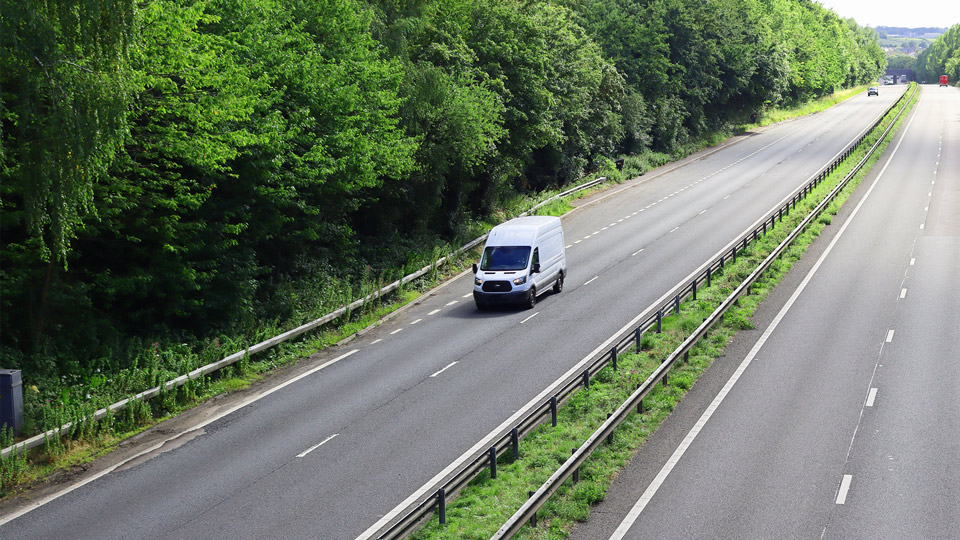
Combating rising fuel prices with fuel performance incentives
April 28, 2022
.jpg)
Customizing mobile workflow and fleet management to better serve drivers
June 5, 2020

Quick guide to off-road fleet tracking
November 2, 2019

Driving Innovation and Navigating Business Risks: Geotab's Gen AI Maturity Index
November 3, 2023
